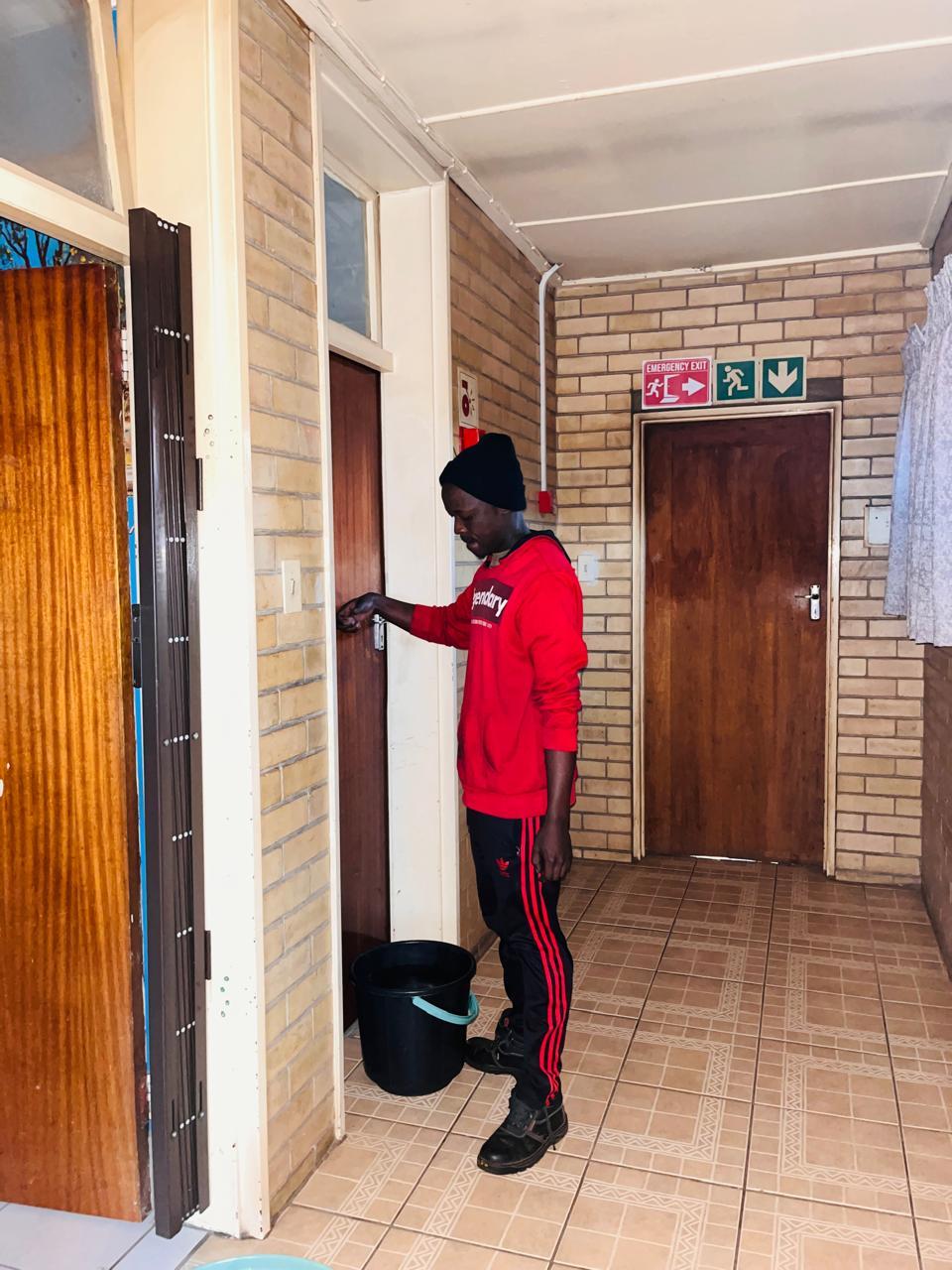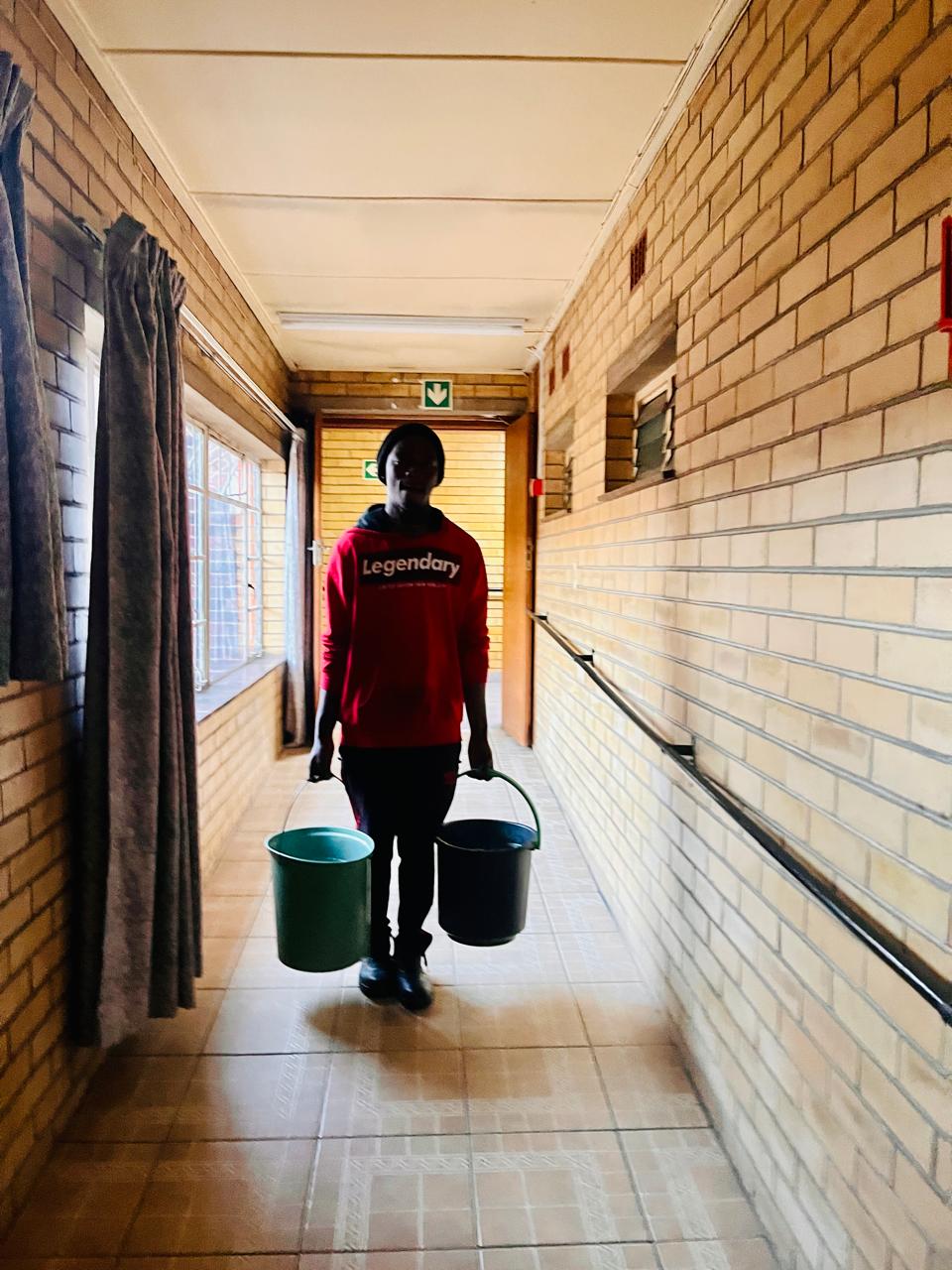
An employee at the Johannesburg Society for the Blind delivers hot water to the blind residents. Photo supplied by JSB.
Disconnection of electricity and water by City Power and Johannesburg Water (JW) over an alleged outstanding bill of approximately R35million has left over 70 blind people and the hard-of-hearing without electricity and municipal water supply at the Johannesburg Society for the Blind (JSB), Klipriviersberg, south of Johannesburg in South Africa.
The cut-off is allegedly due to an outstanding amount of R9million for electricity and R26million for water, which the JSB management strongly believes it is inaccurate. The JSB management has argued that they are charged agricultural business rates instead of NPO or indigent rates. The City Power has not disputed this but said they can only reconnect the centre after receipt of a confirmation letter from the Department of Social Development (DSD), that they cannot assist the JSB with the electricity bill.
Spokesperson for the Gauteng DSD, Motsamai Motlhaolwa has confirmed that the JSB is a registered NPO with the DSD. Motlhaolwa said they are compliant with submission of reports to the Directorate and subsidised by the DSD. The 2022/2023 and 2023/2024 Service Agreement Level between DSD and JSB, seen by the Diary Series of Deaf People, show that the DSD’s budget allocation for electricity and water to the JSB is 1% monthly. Covered in the 1% is water, electricity, rent, stationary, telephone and fax, 40% on salaries for social workers, nurses and caregivers, 33% meals and cooks, 12% cost of cleaning and cleaners, 1% insurance and maintenance, another percent on financial administration, central manager, audit, transport and security costs. The breakdown of the budget is structured by the DSD, and it has to be adhered to and not deviated.
Billing statements only for June 2024 on electricity from City Power is R87,229.32 and water from the JHB Water, R280,574.67, which is higher than the annual amount and monthly funds the centre receives from the DSD.

An employee at the Johannesburg Society for the Blind delivers hot water to the blind residents. Photo supplied by JSB.
The JSB was established in 1926 under the name Society to Help Civilian Blind. From 2013 to 2021, it was led by its late chairman and legendary blind musician, Advocate Steve Kekana. Dating back from Kekana’s tenure, the centre shows that they have been requesting migration from business tariffs to NPO tariffs, but the situation remains unchanged.
Its premises has above 70 units for the blind and staff quarters for 10 of its assistants. Some of the residents have bipolar, others are psychiatric patients, hard-of-hearing and blind at the same time. All residents from the age of 18 to 79 are disability grant recipients of the South African Social Security Agency (SASSA) and have been without electricity for the past eight months and running water from the municipality for almost four years. This has resulted in them relying on water from a borehole, and lighting and few power points partially from a solar system. With the solar, the centre said it depends on the strength of the sun and if there is no sun, they will not have enough power. Therefore, every morning at 6am, the centre’s staff delivers 25 litres of hot water at each resident’s door for them to have a hot bath. They said transforming to the entire solar transformer will cost them R6million.
Each resident pays an accommodation fee of R1,700 from their SASSA grant; this is according to the current chairman, Hennie Els. He said they also depend on the DSD’s subsidy. But the funds, he said, can barely cover their daily living costs as well as that of the centre. This is because funds inclusive of their SASSA grant, covers three meals a day, travel, to-and-fro hospital, and medical care.
In February, JSB lodged a formal complaint against the City Power and JW at the office of the Joburg Ombudsman.
A 79-year-old partially blind and hard-of-hearing resident, John Serrao (79) said:
Serrao added, “We are in a bad situation because I am partially blind, and I cannot even watch TV. We can’t boil water to make coffee to drink. During the day we have to walk a distance to fetch water to be able to make coffee. When I go to the switch, I hope that the electricity will be back. It is difficult because water is a basic human right. We are not the administrator, therefore why are they taking electricity and water from us."
A visually impaired matric student living at the centre, Samkelo Rapopo (20) said it is hard to prepare accordingly for his studies and assessments as they do not have electricity.
“We wake up in the morning and there is no electricity. We need electricity to study, so it becomes difficult for us to study with computers. I came here for the purpose of studying,” said Rapopo a future lawyer.

An employee at the Johannesburg Society for the Blind delivers hot water to the blind residents. Photo supplied by JSB.
City Power’s spokesperson, Isaac Mangena confirmed the organisation is currently billed at business rates as they have not applied for the indigent tariff.
“They have the right to apply for a reseller tariff, but City Power has not received an application from them,” said Mangena.
However, the centre’s CEO, Vangile Nyamathe and Els, showed the Diary Series of Deaf People, a trail of electronic mails demonstrating that they have applied, but they have allegedly received no help.
Mangena added:
Els said they have been discussing the issue with various stakeholders on various levels without any solution.
“Even in the electricity audit done it was pointed out to them. On 26 February 2024 a meeting was held between the various role players at City Power, and it was agreed that the electricity would be restored and monitored for a month to establish the actual cost. This has never happened and JSB is still receiving a very high monthly bill and for a service that does not exist - justifying our claim of wrong billing,” said Els.
Els added that in 2013 management got an outside electricity auditing company to conduct an electricity audit and whatever they have found regarding where electricity was consumed - it was addressed and even the kitchen was placed on LPG Gas. It was found that City Power “overestimated” the usage in the building by "50%.”
JSB said they want the services to be restored and bills to be reconciled for the past 18 years.
Els said although they have not been supplied with water from JW for the past four years, strangely they “still receive a monthly bill of more than R 300,000, again billing for a service that does not exist.”

An employee at the Johannesburg Society for the Blind delivers hot water to the blind residents. Photo supplied by JSB.
Nyamathe said although their “borehole is connected to the pipes and is supplied to the rooms, it is a problem that the residents do not get water supply from the municipality, because water is a human right. So, the municipality should be able to supply water. With electricity, I can still comprehend that we cannot afford it.”
Nyamathe explained that “lighting from solar is also dependent on the sun and how much battery storage we are able to get from it. On cloudy days obviously the battery does not get that full. On a normal day the battery can supply light up until 11pm or 12midnight. It is frustrating because they [residents] don’t only need light. Unfortunately, to get a full-on transformer that will run the whole centre is about R6million. So, at this stage we are unable to afford that. We only managed to get funding of about R600,000 and we utilised it for solar installation that could just run lighting and just a few plugs for them [residents]. If they don’t have light from solar it gets dark.”
She added that the kitchen where the meals are cooked for the residents and the three water boilers have been converted to gas. She said this was done to reduce electricity consumption, but still that has not helped because the bill continues to skyrocket. “With the help from the DSD, the solar system provides lighting during power outage and supplies power to the borehole as the Joburg Water removed their water services since 10 December 2020. This partially mitigated the total disaster that is currently unfolding at JSB,” said Nyamathe.
The Joburg Ombudsman’s spokesperson Corrine Lekhoane said, “Currently the matter is still under investigation, therefore remains an open case. Like any other case, this matter is complex in nature but the respective entities (Joburg Water, City Power, and the Revenue Department) have been engaged with the view to hold a conciliation meeting soon to reach an amicable resolution. The investigator assigned to this matter has also communicated with the complainant and advised of the status of their complaint.”
Although, JW requested for an extension of deadline, they had not responded at the time of publishing.

